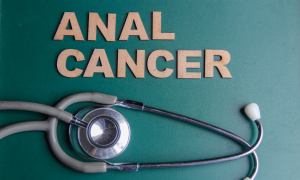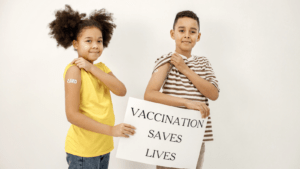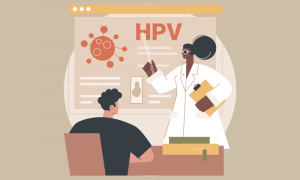
Dr. Joel Palefsky Answers Our Questions About Anal Cancer
Anal cancer is a rare cancer, but cases have been on the rise in recent years. Dr. Joel Palefsky answers questions on anal cancer screening and the recent ANCHOR trial.

It can be difficult to talk to family and friends about any cancer diagnosis. As much as people want to be helpful and supportive, they often say exactly the wrong thing or ask questions that feel too personal or inappropriate. This can be a bigger issue when dealing with HPV-related cancers because they involve sex and body parts we often don’t talk about.
You might feel like people are prying into your personal life or looking for ways in which the diagnosis is your fault because of past behavior. While it’s always best to assume good intentions, you do not have to answer anyone’s questions or share any information that feels too personal.
It can be really helpful to have a team of friends and family helping out with emotional and logistical support, but you are in charge of who you tell and how much you tell them.
Most of your conversations with family and friends will likely be focused on how you are feeling emotionally and physically and how they can help. In the beginning, however, friends might be interested in the details of the cancer you have and the treatments you are doing or will need. Again, you can give as little or as much information about this as wish.
The information here about HPV and HPV-related cancer can help you explain the basics. Your care team will likely be able to offer additional resources on your treatment that you can share with friends or family.
It can feel rude to shut down a friend’s inquiries, but you are not obligated to answer questions. Have a few friendly but firm phrases on hand for when conversations veer toward topics that make you uncomfortable whether that’s the symptoms you’re experiencing now or your past sex life and STI history.
You can say things like: “I really don’t have the energy to talk about that right now.” “I’m not comfortable talking about that, you understand, right?” or “I’m really sick of talking about cancer, can we talk about anything else?”
It is important to talk with your kids about your cancer diagnosis and treatment. Even young kids know when things are different, and if they don’t hear it from you, they might imagine something even worse.
Some people with HPV-related cancers may worry about talking to their children because the topic of STIs might come up. While this can make a difficult conversation feel even trickier, it’s always best to answering children’s questions honestly and simply.
You don’t have to bring up the issue of STIs, but if an older child asks about it, you should be truthful: “Yes, I must have contracted HPV at some point, but I never knew until now.” For tweens and teens, you might want to add that kids their age are now vaccinated against the types of HPV that cause cervical cancer, so they are don’t have to worry.
If a loved one has a specific question that you can’t answer, or you need additional advice on what to say, you can reach out to your cancer care team who should be able to help.
You can also find more information about talking to family, including children, about cancer on the CancerCare.org website. The agency also has counselors on staff, runs support groups, and will answer individual questions by email at info@cancercare.org.

Anal cancer is a rare cancer, but cases have been on the rise in recent years. Dr. Joel Palefsky answers questions on anal cancer screening and the recent ANCHOR trial.

HPV-related throat cancer is now the most common HPV-related cancer in the U.S. Learn more about symptoms, treatment, and prevention from D r. Michael Moore.

Even More Evidence for the Value of Early HPV Vaccination An exciting new study in Scotland found no cases of invasive cervical cancer in young women who had gotten the HPV vaccine by the time they were 14. The study also found that women vaccinated

A new study revealed a disturbing trend in health knowledge; fewer people seem to understand the connection between HPV and certain types of cancer including cervical, oral, anal, and penile cancers.

According to the Centers for Disease Control and Prevention (CDC), about 36,500 HPV-associated cancers occur in the U.S each year.

Actress Marcia Cross Discusses Her Anal Cancer Diagnosis Hoping to lessen stigma and spur conversations between patients and health care professionals, Desperate Housewives actor Marcia Cross recently told CBS This Morning she was diagnosed with anal cancer about a year and a half ago. “High
ASHA believes that all people have the right to the information and services that will help them to have optimum sexual health. We envision a time when stigma is no longer associated with sexual health and our nation is united in its belief that sexuality is a normal, healthy, and positive aspect of human life.
ABOUT
GET INVOLVED
ASHA WEBSITES
GET HELP
© 2024 American Sexual Health Association
Join us for a discussion of Dr. Tang’s new book, It’s Not Hysteria Everything You Need to Know About Your Reproductive Health (but Were Never Told), and ask Dr. Tang your questions about reproductive health!